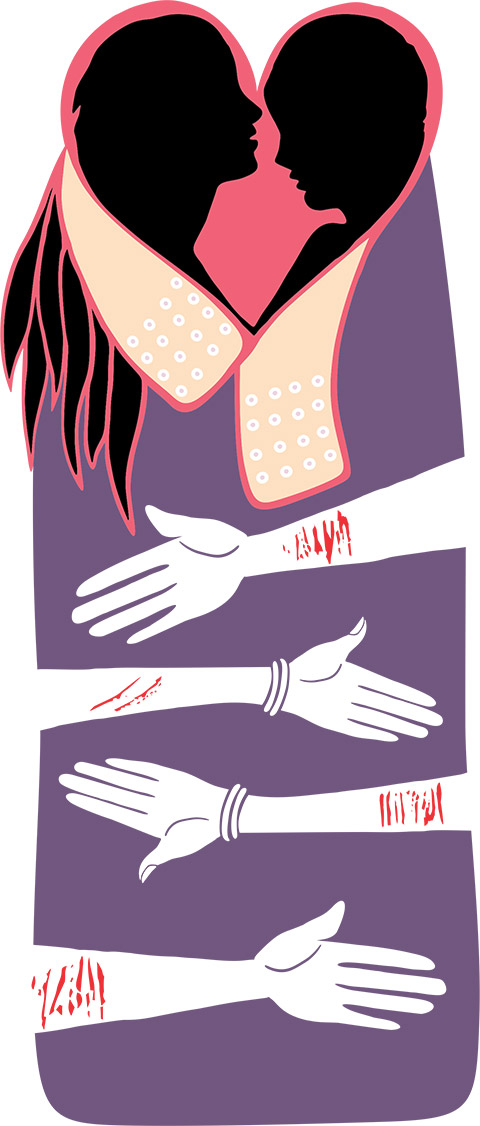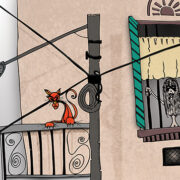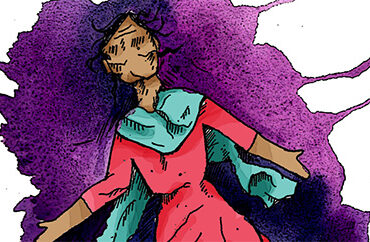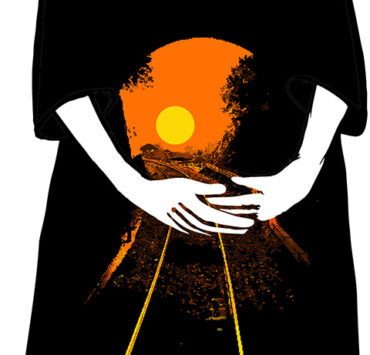I
It began when it did, but it was never over, not really. At least that’s what he thought when she had called that day; out of the blue, after seven years of obstinate silence. At the intended hour, when he walked towards the café, however, the swagger had all but disappeared. She’s probably in the middle of some misguided nostalgia trip, he thought. Although he had never bothered to see the inside of one, he believed this was the stuff women’s magazines were full of.
In the weeks after she had left, well-meaning friends would call him up and ask how he was holding up. I’ve been better and I’ll be better soon, he’d say. Shrugging off his worries—at least in the short-term—had never been much of a challenge for him. It was the seventh night after the seventh night which brought with it all he had worked so hard to forget. And there would be no looking back after that. There would be drugs. There would be blood. Salves and salvation were two poles, and he, like the Earth itself, was slightly flattened at the doorstep of both.
He hadn’t thought of her in a long time now; this was the simple and inescapable truth. Not even he was deluded enough to dream up a dormant passion.
II
She took a long time to fix her hair and her make-up, something which was unusual for her. It was time already, but never mind, she thought. No time like the present to try being fashionably late. Who knows, he might even find it charming. Back when they used to live together, he would make a joke (generally a good one, for even in his darkest days, he could be unexpectedly funny) about her lack of graces, and how her insouciance was really a deep-seated frustration with not being very ‘lady-like’. What he had never understood was that this same gaucherie was a manifestation of the most feminine side of her. Although he had stubbornly resisted her attempts to bring poetry into his life, she managed to pin him down (quite literally, after sex) one day and recite to him one of her favourite poems.
Gift him what makes you woman, the scent of
Long hair, the musk of sweat between the breasts,
The warm shock of menstrual blood, and all your
Endless female hungers.

If he were indeed willing to give them another shot—like she hoped he would—would he be more receptive to poetry this time around? Did he still have all his hair? Had his pad gotten any cleaner? Was there still a pad somewhere? Was there a woman somewhere? Did he still like to use filter tips and rolling paper instead of machine-rolled, readymade cigarettes?
Did he still like to use a belt?
III
As he sat at a corner table at the café, waiting for her to arrive, he thought that ‘quixotic’ would be a good word to describe the last seven years for him. He loved re-reading that book. (He loved old books in general, but not old copies, you see; they made him sneeze.) He felt there was nothing more violent in all of literature, and nothing funnier. (Nabokov had it only half right when he denounced it because of its ‘hideous cruelty’.) Perhaps the one made sure of the other. He ought to know. Every time he left marks on her body, there would be hilarity, and he could stop its march no more than he could rein in the incoming tide. It was funny, because Quixote—and he himself—weren’t fundamentally violent people, he felt. He likened it to a ‘cheat code’ in a video game, where you would start shaking and blinking and shining in a perverse, wraith-like existence, mowing down friend and foe with absurd ease, looting all the assorted treasures of heaven and earth. And imagine your surprise when the world (in this case, the world of the video game) rewarded you handsomely for becoming this ghostly apparition!
But one day, after he finally caught her on the face, just below her left eye, it stopped being funny. Was the immediacy of the injury too much for him to handle? It was almost as if he had consciously avoided hitting her face until then—which he hadn’t. And in any case, when they made up and fucked to celebrate, he would see where he hit her, of course; criss-crossed patchworks of scar tissue on her back, her hips. Maybe it was because he was too fond of her face, impossibly symmetrical, a little too easy to spoil. Maybe he was disgusted—as an aesthete, you understand—at this downright ugly thing he had created.
In any case, after that day, guilt gripped his heart in a vice grip, and refused to let go. It filled his days and nights with a despair that he hoped would be the end of him. He knew, in that moment as he saw her packing her bags, that he would never hit anyone ever again. But that wasn’t strictly true, of course.
When you give to the needy, let your left know how to cut your right without killing.
IV
She had never thought of herself as a needy person. But perversely enough, she became just that the moment she gathered enough courage to finally leave him. As she packed her bags—this time for real, not merely packing while anticipating the inevitable reconciliation—she could feel herself shrinking, retreating to a world she hadn’t yet sketched adequately. She turned up at an old friend’s place, and they were in bed within the hour. The sex was so good that she felt like bottling it up and tucking it away neatly in the kitchen cabinet. She felt terrified, spooked out of her wits.
From then on, fear began to chip away at the love in her life, and she let it. She would flee to men and then make them chase her away from their lives. She would flee to men who would save her from the last one, who didn’t know that their rescue was really a non sequitur. Friends would avoid introducing her to men—they knew what would inevitably follow. Inside of her head, she was the battered woman who had found the courage to move on with her life. And she had been finding it, over and over again, each time with renewed steel.
One day, she bumped into his sister, who she hadn’t met since the break-up. She had braced herself for a barrage of accusations or a concentrated dose of calculated coldness. Instead, she found herself listening to a story.
It was an old-fashioned sort of story at first, and it involved a knight. A knight who swooped in to save the fair maiden, time and again. A knight who didn’t mind losing out on the maiden’s attentions, as long as the act of rescuing her meant something. A knight who had been tirelessly—one might even say ruthlessly—going through these noble quests. He neither lusted after nor declined what treasure came his way. But he made sure that he counted on his fingers carefully.
When the countdown ended, he would wake up in the middle of the night, turn his back on all of the treasure and never be seen in that town again.
Are you listening to me? I need you to talk to my brother.
V
Hi.
Hi.
Your sister gave me your number, in case you were guessing.
I wasn’t. I knew.
Okay. How’ve you been keeping up? She said that—
I know what she must have said. That I suffer from a messiah complex. That I’m an idiot who’s letting guilt as old as the devil ruin my life. That there’s nothing you or anyone else can do about it, but do you think you could try anyway, just in case?
(…)
Now, there’s much one can say about a conversation which starts off like that, but to say it would be even more tedious than the conversation itself. He would not stop being passive-aggressive. She would not stop trying to draw him out. Even when they spoke about books, something they both liked—during and before these last seven years—they could only find it within themselves to spar.
Chuck Palahniuk is mostly rubbish; sublime when he finds whatever concoction of narcotics he finds to be groovy. (No, he’s simply rubbish, she said.)
John Barth is the only living novelist who ought to be made compulsory. (No, he should compulsorily be torched to a crisp, he said.)

Just then, the empty glass tumbler which he was holding burst into pieces, leaving him bleeding. Gasping, she immediately began to sweep the glass fragments off his hand with a tissue, before emptying her purse out on the table in pure, blind panic. Vanity case, pens, notebooks—and what seemed to be a sizable number of bandages, of which she took one and put it on him, in a clearly practised motion.
Okay, you don’t have to look at me that way, it was my ex-boyfriend—he, well, I don’t have to tell you what he liked to do.
(Silence.)
What? Let go of my hand—
But he wasn’t letting go. He had had quite enough of letting go. Her wrist, now not too far from his eyes, showed small, straight, clean cuts, like the ones found on people who know what they are doing, who know exactly what they need; nothing more and nothing less. Without easing his grip, he wordlessly held up his right hand in front of her, so that she could look into the mirror he was offering her.
Was theirs a strange love? One can’t say for sure, but they did love strangely, it has to be said.
He was weeping freely now, and she held him tight against her, his head buried between her breasts. After all these years, they didn’t need to rush themselves as they held each other in mutual acknowledgment of all the pain they had inflicted, the pain that was theirs and theirs alone to cherish.











I might be wrong but there’s some part of the story with an influence of Wallacian(David Foster) comical prose. Many times in the story, I felt like you have brought a tone that’s somewhat similar to “Adult World” short story from Brief Interviews with Hideous Men. Great story, that one and this one too.
@manojwowie92:disqus : :) Thanks, I loved Adult World, I did. Very flattering to be compared to DFW, although Adult World’s experiments with form and language are something I hope to avoid for the moment – at least until I figure out where I stand on the form vs content graph.
beautiful…mesmerizing…